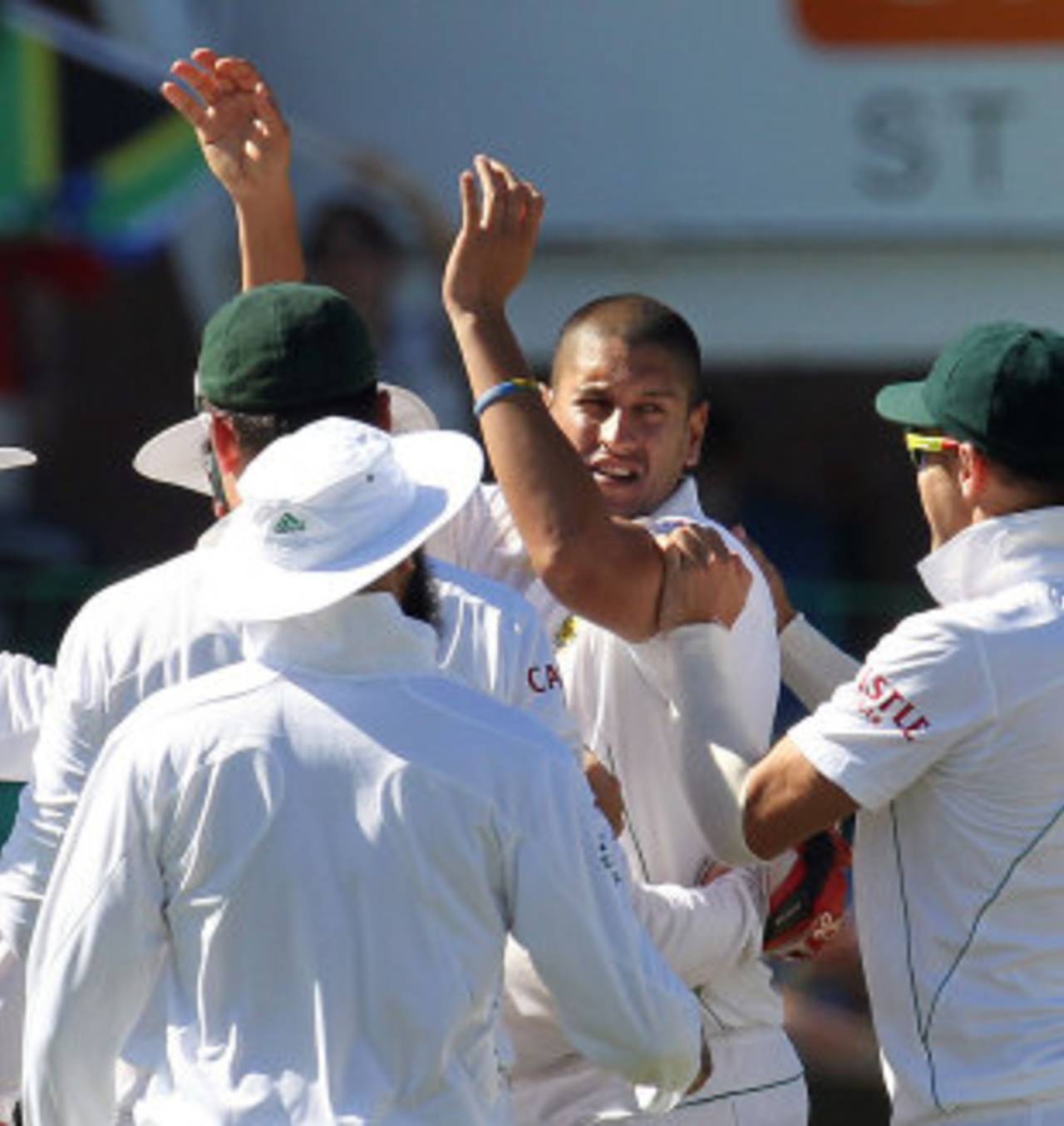Less than ten minutes after South Africa had completed back-to-back Test wins at home for the first time since beating Bangladesh 2-0 in 2008, they were already thinking of the next challenge. It was not that remarkable that Lonwabo Tsotsobe, who was not part of the Test squad, was bowling on the St George's Park practice pitch in the immediate aftermath of the
victory, but it was surprising that all the members of the coaching staff were with him.
Gary Kirsten, Allan Donald and Russell Domingo along with Paddy Upton and fitness man Rob Walter were all out with Tsotsobe. That left perhaps only the logistics officer Riaan Muller in the change-room to welcome back the successful unit. Maybe there is nothing to that, but it perhaps explained a word that became commonplace during South Africa's quest for the No. 1 ranking: "processes".
Over the last few series, celebrations have become less exuberant because every achievement is being contextualised as being part of something bigger. After their victory in Perth, which clinched successive series wins in Australia, some of the players flew home immediately. Those who stayed behind had a fairly measured time at a local pub. After the Newlands win, they dispersed immediately, and the same will happen after Port Elizabeth.
Family time is prioritised, especially for coach Gary Kirsten, whose youngest child is just over a year old. He has transferred that philosophy to the rest of the squad. In doing that, he has also given them perspective, which will be much needed because of the overwhelming fashion in which they dealt with New Zealand.
South Africa would always have expected to win this series. They may not, however, have thought victory would come as easily as it did. In both matches, New Zealand followed the same pattern of rolling over and being heavily defeated. South Africa had to change almost nothing. Even when they made a forced change to their starting XI, it virtually had no effect on the final result.
For many, that was proof of South Africa's depth, and even for others, for whom it wasn't, it did reveal some positives. Fringe players notching up results against a struggling New Zealand may not be an ideal shop window for what lies in South Africa's cupboard. But it allowed the likes of
Rory Kleinveldt and
Dean Elgar to settle on the international stage without the pressures that come with playing in a more competitive outing. Even if neither go on to record streams of success, they have been given the best opportunity to do so because of this experience.
Blooding talent was one of the aims of this series; applying themselves ruthlessly was another. South Africa managed both. In the past, they have been known to play to the standard of the opposition, even when it required slumping to it, rather than to their own potential. In this series they did not allow that haze of mediocrity to descend, except for a few overs after tea on the second day of the first Test when New Zealand were given some freebies.
The brutality was evident most in the bowling. New-ball spells that were accurate and hostile continually asked questions of the New Zealanders' technique outside the off stump, and revealed that they had not worked out the art of leaving. Dale Steyn found more swing than he had in the last year and with him moving the ball at pace, New Zealand had a dual challenge.
Steyn's return to his best took the spotlight off Morne Morkel, who caused problems of his own by creating pressure. He was the most economical bowler among the seamers, conceding marginally fewer runs than Steyn. Since the last time Morkel played New Zealand in March 2011, where he took the only six wickets to fall in the second innings of the Wellington Test, he has been more consistent and more destructive. Previously Morkel could be erratic, now he is as miserly as he is mean and that will be key to South Africa's future success.
While the bowlers caused frenetic action, the batsmen were able to restore calm immediately afterwards, showing South Africa's ability to divorce one part of a match from the other. Alviro Petersen was the first to do that, with his serene century after the madness of the first session in Cape Town, and Hashim Amla delivered one of his typically calm knocks in Port Elizabeth.
South Africa's top four did what New Zealand's could not. They created situations for their middle order to play with freedom rather than rescue them from impending disaster. Presenting the opportunity is different from taking it, and AB de Villiers led in the creativity stakes along with Faf du Plessis, and then Dean Elgar followed suit.
When South Africa review the series, they will conclude that everybody had a good run. If this was a final school examination, everyone would have passed and obtained the necessary points to reach the next level, but obviously not every series will be this easy.
South Africa host Pakistan in two weeks for three Tests, and then play them in the United Arab Emirates later in the year, before the home series against India and Australia. What they can take into those challenges besides reputation is form and confidence.
The win over New Zealand gave South Africa their fifth consecutive series victory. In that period, they have only lost one match (to Sri Lanka in Durban) and won eight. They are dominating, but will only continue to do so if they are able to maintain the same standards they did against New Zealand and the same refusal to slacken.
Firdose Moonda is ESPNcricinfo's South Africa correspondent
